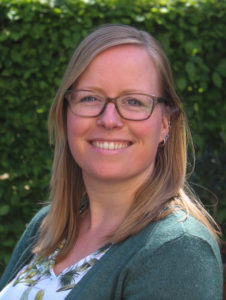 Janne-Mieke Meijer is an Assistant Professor in the Soft Matter and Biological Physics group at the Applied Physics department of Eindhoven University of Technology (TU/e). Her research focuses on complex colloidal systems to discover the fundamental principles of how building block design influences self-organization and how to control the self-assembly process to engineer new materials. Janne-Mieke obtained a BSc. in Chemistry, a MSc. in Nanomaterial Science and a PhD in Physical and Colloid Chemistry from Utrecht University. She completed a postdoc at Lund University, and a Humboldt postdoctoral fellowship at the University of Konstanz. She received a Veni personal grant from the Dutch Research Council in 2018. She can be found on Twitter @JenneMikie and Instagram @JMs_colloids.
Janne-Mieke Meijer is an Assistant Professor in the Soft Matter and Biological Physics group at the Applied Physics department of Eindhoven University of Technology (TU/e). Her research focuses on complex colloidal systems to discover the fundamental principles of how building block design influences self-organization and how to control the self-assembly process to engineer new materials. Janne-Mieke obtained a BSc. in Chemistry, a MSc. in Nanomaterial Science and a PhD in Physical and Colloid Chemistry from Utrecht University. She completed a postdoc at Lund University, and a Humboldt postdoctoral fellowship at the University of Konstanz. She received a Veni personal grant from the Dutch Research Council in 2018. She can be found on Twitter @JenneMikie and Instagram @JMs_colloids.
Read her article ‘In-situ characterization of crystallization and melting of soft, thermoresponsive microgels by Small-Angle X-ray Scattering’.
How do you feel about Soft Matter as a place to publish research on this topic?
Soft Matter is an excellent interdisciplinary journal bridging physics, chemistry, and biology. It is a great place to publish and follow exciting works on these soft microgels that encompass features of both colloids and polymers.
What aspect of your work are you most excited about at the moment and what do you find most challenging about your research?
I am very excited about the work we are doing on different aspects of colloidal self-organization. Thanks to advances in synthesis and versatile assembly methods we can now finely tune colloidal complexity in terms of interactions, ranging from repulsive to attractive, and from hard to soft, while at the same time we can achieve almost any particle shape. The biggest challenge right now is to bring together the expertise and control needed to perform the colloidal experiments that can become quite complex. It is our aim to have control all the way from the synthesis of the colloids to the detailed analysis of the forces at play.
In your opinion, what are the most important questions to be asked/answered in this field of research?
The self-assembly of molecules, nanoparticles and colloids is key to many natural and engineering processes, yet we do not fully understand how dynamic pathways or selective recognition control the final assemblies and hence the bulk material properties. To understand this complexity, we need to answer fundamental questions about how force, shape and composition dynamically interact and find out when equilibrium and non-equilibrium states emerge. Experimental studies of colloids can help us unravel these complex fundamental processes, and ultimately identify the design rules. This will open the way for a next generation of particle-based materials but will also generate new and important insights for condensed matter and biology.
Can you share one piece of career-related advice or wisdom with other early career scientists?
Find a research direction that you are passionate about, this will make sure you have fun in your day-to-day research, and make a career plan. Even though most of the time these plans will not pan out, I found that this is key in setting your priorities right.










